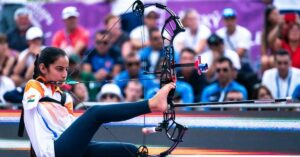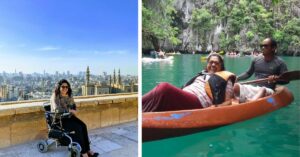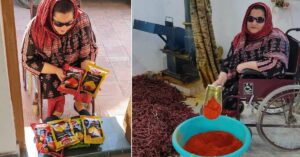Suffering From Polio, Woman Left a Legacy That Helps People With Disabilities Find Jobs
Founded by N S Hema, who lost her legs and one arm to polio, the Association of People with Disability is an NGO that provides horticulture training to people with disabilities to help them become skilled landscapers and gardeners.
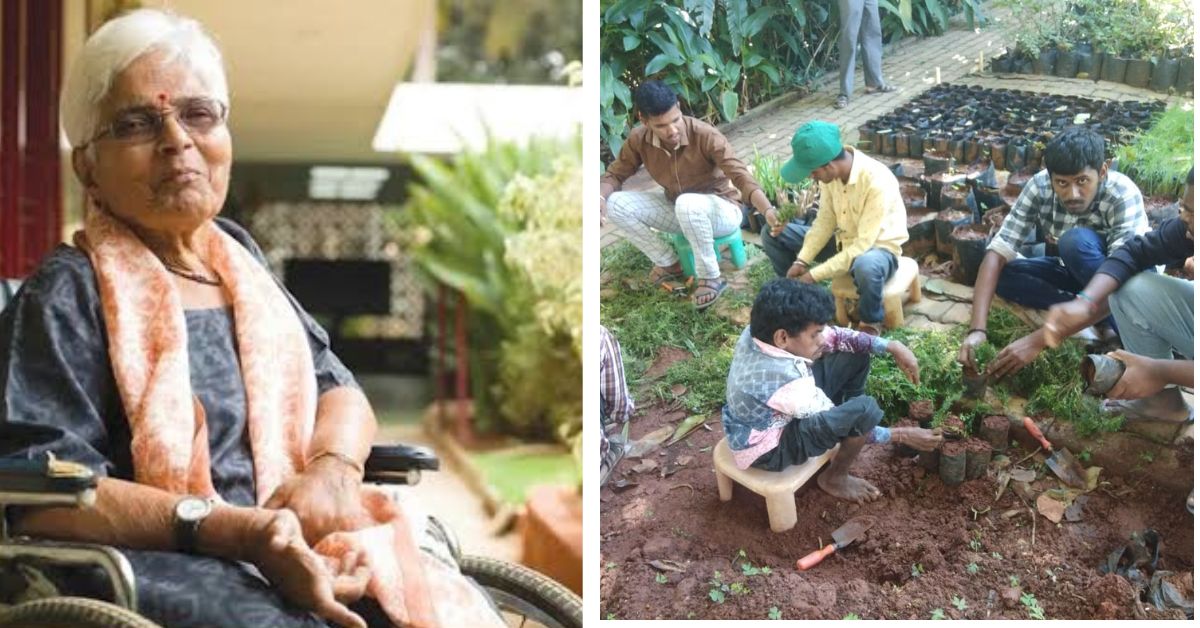
Bharat Tani, a 22-year-old, was living a life full of hardships till he came across a camp by a Bengaluru Non-Government Organisation (NGO) called the Association of People with Disability (APD) in Channapatna.
“I am visually impaired, and all my life, all I have known is struggle. When I went into this camp, I was not aware how it would help me gain confidence and provide me with the skill to get a job. But I went for it and got trained in horticulture. Today, I can grow mushrooms and many other vegetables and fruits, all on my own,” he says.
What would have been unimaginable for Bharat a few months ago, is now a reality.
A similar tale was narrated to The Better India by 25-year-old Pritam whose life took a turn for good when he met volunteers from the Association of People with Disability. Pritam was born without any hearing ability and was forced to live without any means of either education or work.
“I am from Channapatna and I had no work. At APD, I was given various options to learn from and I chose horticulture. Today, I, who had no education till now, have so much knowledge about growing vegetables, fruits, flowers and soil, all thanks to APD,” says Pritam adding, “The most important thing that I received from APD is not just knowledge but also confidence. The volunteers told me how I deserved to get educated and earn a livelihood.”
Both Bharat and Pritam are now looking forward to the placement session, where they would have the opportunity to get jobs in urban and rural sectors. Like them, many people have benefited from the horticulture training program conducted by the APD.
It all started in 1959 when N S Hema, who suffered from polio in her childhood, came to Bengaluru with a vision to do something for people with disabilities. While Hema passed away in 2016, her legacy still lives on. Her followers have helped disabled people across the country for decades.
“Those days, life was really hard for people with disabilities. Hema lost both her legs and one arm to polio at a very young age. The situation back then was so bad that she could not even find herself a wheelchair,” shares N S Senthil Kumar, CEO of the NGO.
Giving livelihood along with confidence
Senthil shares that the horticulture training initially started as horticulture therapy.
“The founder herself found a lot of peace in gardening and tending to plants. There’s a lot of research to suggest that being with plants can be therapeutic, and so, the program started off with that intention. The realisation that this might have the potential to grow into something else came much later,” says Senthil and adds, “We had procured a five-acre land 15 years ago. Bangalore being a garden city, we realised that we could provide skilled people to meet the growing demand for plant growers.”
It was in 2015 that APD started running the horticulture training program under the livelihood vertical of the NGO. The program aims to help disabled persons earn a livelihood by giving them skill-based training.
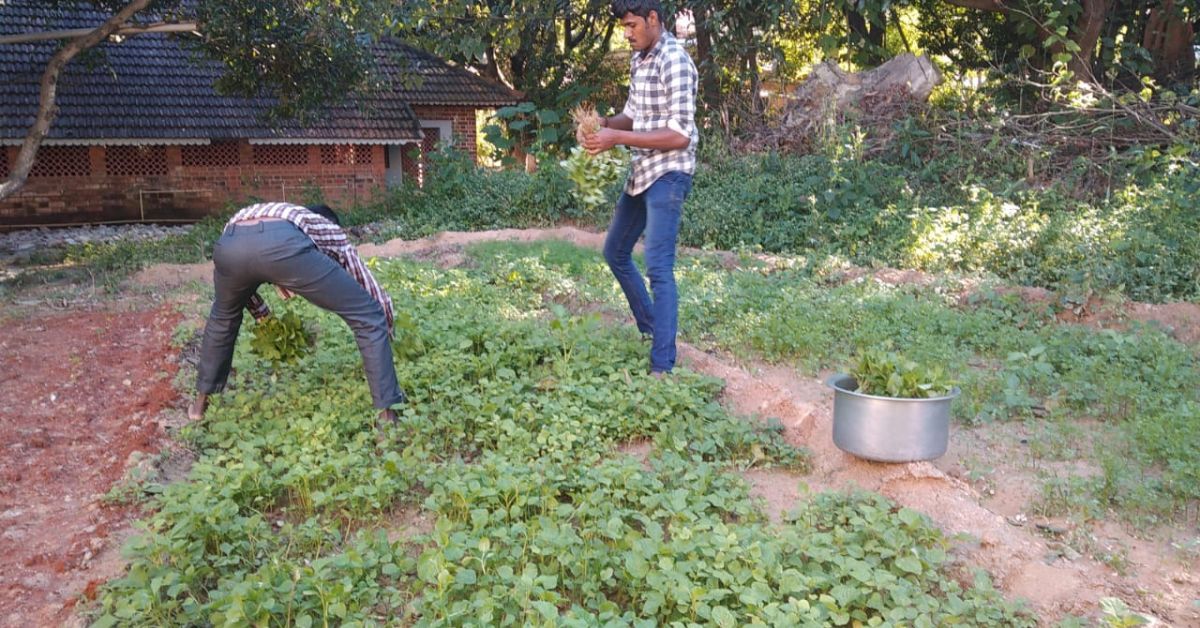
The four-month-long training program teaches its pupils the basics of horticulture.
“We identify youth from different taluks and districts and train them. After they complete their training, they become skilled enough to get gardening, landscaping and planting jobs in corporate offices in and around Bengaluru. Whatever the pupils grow during the training is collected and sold on a donation basis which is used to train other batches,” he says.
Explaining the curriculum of the training program, Raghu P H who has been a trainer for the last 14 years says, “The program curriculum includes basics of horticulture — growing indoor plants and outdoor plants, landscaping, growing medicinal plants and crop protection, garden supervising etc.”
“The course helps them to get a job with a salary ranging between Rs 10,000 and Rs 15,000. The training routines are so hands-on that it helps them to develop good hand and eye coordination and also gain confidence,” Raghu further adds.
The NGO has trained over 5,000 disabled persons in horticulture who have gotten jobs in places like Earthling Service Pvt Ltd, Garden Care Nursery, Mitti Café, St Joseph’s School, Star Nursery etc.
A home for everyone
The NGO has been serving as a haven for people with all kinds of disabilities and from all age groups.
“We identify people with disabilities, especially those hailing from rural areas and having underprivileged backgrounds and give them an orientation about the various programs that we conduct,” explains Senthil.
He continues, “We have four verticals in our NGO. First is the health and rehab vertical that focuses on early intervention. We intervene at Primary Health Care centres (PHCs) when we get the information that a child with a disability is born. Then we make necessary arrangements for them and train their mothers to help the child. Under this program, we reach 2,500 children every year.”
“Another programme is inclusive education. We have schools in different locations in Karnataka affiliated with the state board, and we provide our wards with free education. Here, the classes are available till Class 7, which is a conscious decision because we want our students to go out and experience schools with other children also,” he says.
Senthil informs about a livelihood vertical which helps disabled people to find work opportunities. The horticulture training program comes under this vertical.
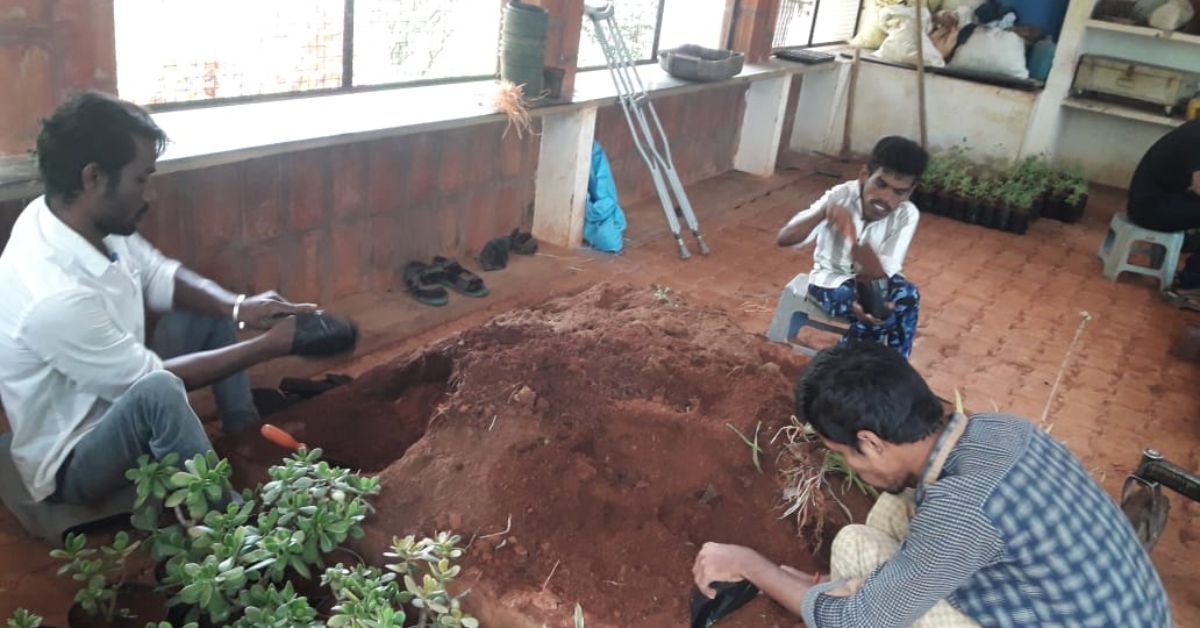
“Besides training them, we also provide them with the necessary equipment. Say a person needs a wheelchair or an artificial limb, we arrange for that so that they put their best foot forward in front of potential employers,” adds Senthil.
APD also has a program which helps people with spinal cord injuries. They have a 75-bed facility at a campus in Indiranagar.
“We have a database of potential employers and recruiters like Dmart, Reliance Fresh, and Vishal Mart, who provide employment to our people. The NGO itself works on the philosophy of ‘for the people and by the people’, and so a lot of disabled persons find jobs within the NGO and earn a livelihood,” he says.
APD also reaches nearly 1,500 people with disabilities who also have mental health issues to provide therapy and prescribed medication every year.
“We believe in community building and sensitising people towards disability. We hold various programs, especially in schools, to sensitise the coming generation to the issues that people with disabilities face,” he says.
“We have conducted various workshops and reached out to nearly 9,500 able-bodied students and children in 2022 and aim to continue doing so. What we want for disabled people is not just to have paid work to support themselves and subsequently their families, but also for them to gain confidence to live a respectable life,” Senthil concludes.
You can reach out on their official website or call 8025475165.
Edited by Pranita Bhat, All images courtesy – The Association of People with Disability
If you found our stories insightful, informative, or even just enjoyable, we invite you to consider making a voluntary payment to support the work we do at The Better India. Your contribution helps us continue producing quality content that educates, inspires, and drives positive change.
Choose one of the payment options below for your contribution-
By paying for the stories you value, you directly contribute to sustaining our efforts focused on making a difference in the world. Together, let's ensure that impactful stories continue to be told and shared, enriching lives and communities alike.
Thank you for your support. Here are some frequently asked questions you might find helpful to know why you are contributing?


This story made me
-
97
-
121
-
89
-
167




